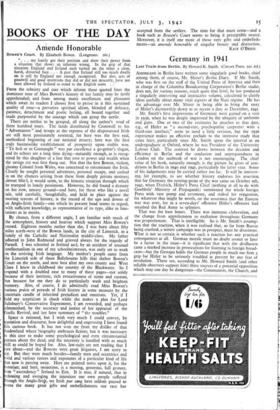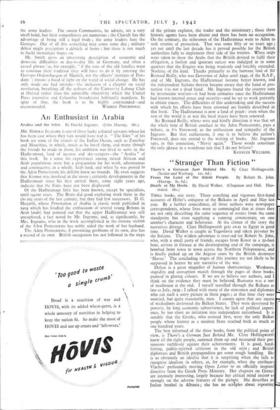Germany in 1941
Last Train from Berlin. By Howard K. Smith. (Cresset Press. sos. 6d.)
AMERICANS in Berlin have written some singularly good books, chief among them, of course, Mr. Shirer's Berlin Diary. If Mr. Smith, who was first on the staff of the United Press of America and then in charge of the Columbia Broadcasting Corporation's Berlin studio, does not, for various reasons, reach quite that level, he has produced a singularly interesting and instructive volume, calculated to clarify ideas usefully about many vital aspects of the Nazi regime. He has the advantage over Mr. Shirer in being able to bring the story 01 Hitler's dictatorship down to as recent a date as December, 1941. Mr. Smith's first impressions of Germany were gained on a visit in 1936, when he was deeply impressed by the ubiquity of uniforms and guns. One or two of the estimates he attaches to that date, e.g., of Hitler as "a second-rate, psychopathic carpenter with a third-rate intellect," seem to need a little revision, but the 1936 experience makes an effective prelude to the intensive study that came later, particularly since Mr. Smith spent the interval as an undergraduate at Oxford, where he was President of the University Labour Club. The contrast he draws between the decision and efficiency in Berlin and the confusion and unpreparedness in London on the outbreak of war is not encouraging. The chief value of his book, naturally enough, is the picture he gives of con- ditions in Berlin in 1940 and 1941, particularly the latter year. Some of his judgements may be carried rather too far. It will be interest- ing, for example, to see whether history endorses his assertion that for Germany the turning-point of the war came on October 9th, 1941, when Dietrich, Hitler's Press Chief (nothing at all to do with Goebbels' Ministry of Propaganda) summoned the whole foreign Press with vast pomp and ceremony, and staked his reputation, for whatever that might be worth, on the assurance that the Eastern war was over, for in a seven-days' offensive Hitler's offensive had smashed the Red Army to splinters.
That was the bare bones. There was immense elaboration, and the change from apprehension to exaltation throughout Germany was proportionate. That is intelligible. So is Mr. Smith's assump- tion that the reaction, when it was realised that, so far from Russia being crushed, a winter campaign was in prospect, must be disastrous. What is not so certain is whether such a reaction has any practical consequences at all. German morale must no doubt sooner or later be a factor in the issue—it is significant that with the disillusion came a marked increase in prosecutions for listening to foreign broad- casts—but the Gestapo holds the German people in much too firm a grip for Hitler to be seriously troubled at present by any fear of revolution. There are, according to Mr. Howard Smith (and other reliable observers support him) three sources of a potential opposition which may one day be dangerous—the Communists, the Church, and the army leaders The sworn Communists, he admits, are a very small band, but their sympathisers are numerous ; the Church has the advantage of being still a legal body ; the army leaders hate the Gestapo. Out of all this something may come some day ; military defeat might precipitate a debacle at home ; but there is not much to build immediate hopes on.
Mr. Smith gives an interesting description of economic and domestic difficulties in day-to-day life in Germany, and often a casual phrase (as, for example, " if the sons of the old families want to continue their tradition they will have to do it by entering the Gestapo Ordensburgen of Munich, not the officers' institute of Pots- dam ") throws a flood of light on the trend of social change. He has only made one bad mistake—the inclusion of a chapter on social revolution, breathing all the ardours of the Univers:ty Labour Club at Oxford rather than the admirable objectivity which the United Press journalist and Columbia broadcaster habitually manifests. In spite of that, the book is to be highly commended—and



























 Previous page
Previous page